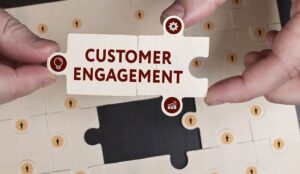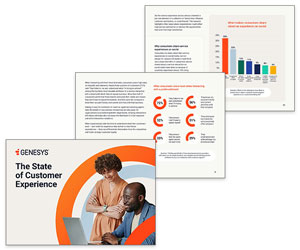It’s Monday morning in the contact centre and after a quiet weekend, the calls are pouring in. The wall board is flashing a large queue and all hands are to the pump.
Wrap time is being squeezed, call text is scant and agents are feeling the pressure. Sound familiar? Here Carolyn Blunt shares her experiences with us.How do you ensure that your team members don’t fall into the common trap of wrapping up one call as they start the greeting for the next?
What could be wrong with doing that – surely that makes for a faster, more efficient service? In my experience allowing advisers to answer a new call before they have finished the last causes the following:
- The first few seconds of the new call are not concentrated on, as the adviser’s mind is still in the last call and they are usually concentrating on typing out call text or logs.
- The first ten seconds of every call are crucial for building rapport and assessing the caller’s mood and if this is missed rapport can be difficult to achieve for the rest of the call and the adviser may misjudge the caller’s mood, leading to poor customer service.
- If a customer feels they are not being listened to then what was previously going to be a straightforward call now becomes a difficult one – that takes longer to resolve (thereby keeping other calls waiting even longer!), results in less satisfaction and/or sales and creates disgruntlement with the adviser, who now naively wonders ‘why am I getting all the difficult calls today?’ and that negativity can be carried into the next call – so perpetuating the cycle.
So how do you ensure that your team members are fresh and focused for each call?
- Encourage proper use of wrap time. Be careful of rewarding (through praise or otherwise) the shortest possible wrap times, it encourages call handlers to cut corners and run their calls together.
- Listen in to calls, paying particular attention to the first 30 seconds and how focused the adviser sounds to the caller. Coach on energy, intonation and listening skills – supplementing with further communication skills training as needed.
- Allow ‘cool down time’ for those who have dealt with an unusually difficult or angry caller. This only needs to be a few minutes to stretch their legs outdoors, listen to an uplifting track of music or splash some water on their face. ‘Cool down time’ should not be used to relive the call with you or other team members – save this for a coaching session. Encourage them to refresh and allow a line to be drawn under it if you want them to move on and take more calls immediately.
- Distinguish between real and perceived pressure when it comes to calls waiting. Aim to pass on a sense of urgency to your team members only when it really matters; otherwise you will be forcing people to shorten call durations at the expense of quality – which simply creates dissatisfied callers and/or more calls when callers call back with another question, something that was missed or a complaint.
- Recognise the repetitive nature of the job. Rota people wisely and offer breaks from the phones where you can, e.g. in the form of small projects, team newsletter production. You can even create roles such as a ‘birthday monitor’ whose task is to go round and get cards discretely signed for team members’ birthdays, etc.
- Don’t let people waste their break times. Encourage them to go out for a walk to clear their heads and avoid afternoon energy slumps. Quiet reading away from the desk is also a good break from talking. You could even start a book club!
- Don’t neglect the basic needs of your team members. Ensure the temperature is comfortable – nothing is beyond your control, get enough portable heaters or coolers as needed. Ensure they have continuous access to water to keep the brain and body hydrated and ideally plenty of natural light and good air circulation to keep them alert. Having a well watered plant on the desk also helps to keep the surrounding air hydrated and while some organisations don’t allow it, I believe family photos, holiday brochure cut-outs or a photo of the type of car/house I aspire to own act as an excellent motivational incentive and constant reminder of why I come to work.
- Don’t set a bad example with coffee, chocolate or nicotine. While these stimulants cause a temporary increase in energy the resulting slump is lower than where you started from. Sustainable energy comes from water, fruit and fresh air. Swap the Friday afternoon cakes for some strawberries (dipped in a little chocolate if you must!).
As a team leader it is your responsibility to walk the talk and you should be a role model for the levels of energy and positivity you want to see from your team. If you storm back into the office after a bad meeting it is exactly the same as carrying negativity from one call into the next.
Show your team members that sometimes we just have to manage ourselves effectively and move on. Moaning and whinging only cause us to relive the pain or annoyance of an experience and bring down others around us as well.
Use specific praise to reinforce when people remain buoyant after a hard call and use daily team talks and/or weekly team meetings as an opportunity to have a couple of minutes of fun and motivate your team to do their best on every call.
Carolyn Blunt is a Training Consultant with the Training Consultancy Real Results.
Author: Jonty Pearce
Published On: 28th May 2008 - Last modified: 13th Jan 2025
Read more about - Call Centre Management, Carolyn Blunt, CX




















good but a leanghty one appritiate your patience ..a small request on my end some where i see the spark missing in your script …for sure good job but you can be a better one if you want to
how do you get outbound callers to focus???
I am an agent at one the mainline airlines, and the problem me and my co-workers have with AHT is, that the goals are not truly and honestly measureable. How can one control,even with all the helpful hints, the time spent on the phone talking to a customer without rushing them. You know, we are not counting widgets. We have to deal with a great body of job knowledge; and then, answer a myriad of questions the customer might have(involving, mostly, travel agents, who will not do the homework before calling)quickly and precisely.